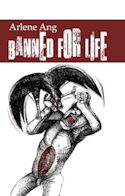|
KYSO Flash ™
Knock-Your-Socks-Off Art and Literature
|
|
|||
Banned for Life
|
| Misty Publications |

Arlene Ang |
On the sixth of October, a slender package arrived from Misty Publications, but I hadn’t ordered anything recently, didn’t recognize the author’s name—and my goodness, that disturbing image on the front cover! If the content described things so torturous, who would want to read it? Not me. How in the world did this end up in my mailbox?
Then I flipped the volume over and noticed the photograph of a demure-looking author next to a reassuring bio. Scanning the blurbs, I was intrigued by such phrases as “splendid surreal imagination” and “an exquisitely unhinged collection.”
Sounded promising. So I opened the book randomly to page 50, where I found to my surprise a haibun! What were the odds? Having discovered haibun a few months earlier, I had fallen in love with this 300-year-old Japanese form—essentially, distilled and luminous prose poems containing at least one haiku. Always looking for more, I was delighted with this unexpected good fortune. And as pleased with this one’s visual symmetry as I was moved by its story:
Rupture
a grackle and a cloud
flew the bicycle
the day before stillness littered the grass
At first, everyone thought it was the war. The noise threw the contents of a garbage can on the sidewalk: fishbones, sunflowers, a floorboard, blood. In my mouth, the language of windows, unlatching. Even then, I knew something had gone terribly wrong from the way people came out of their houses and placed their feet around the yellow convertible.
the cracked windshield
the dead insects
and still the wind is caught in continuance
At some point, I stopped stirring the eggs in the pan. I wanted to do something osé; I wanted—badly—to burn objects that bore no relation to me. The Dear Anthony note on the fridge smelled of a mother walking back and forth in the kitchen. I put my hand on the knob. And the front door opened, like a mouth after the last breath has gone from it.
the boy in the haze
spun out of his skin
spun so fast the world stopped for six minutes
One mother’s terrible knowingness, the eggs left to burn in the pan, the neighbors’ feet gathering around the convertible, the rotation of time stopping—this stunning poem came at me from every angle, slamming all my senses simultaneously. Moreover, the fresh and unexpected imagery, the use of metaphor and simile, saving the longest line for last in the haiku verses—all served to stretch the bands of convention for this poetic form, resulting in an experience that for me was immediate and visceral.
How did the poet do that?! With only 178 words?
One answer is that Arlene Ang intuits well what to keep and what to leave out. And what she keeps—in this haibun and in poems throughout this book—often subverts expectations, delightfully so. One small example: “Stillness littering the grass.”
Whether she’s writing haibun, or lineated and prose poems, it’s clear that Ang has a “gift for searing juxtaposition,” to quote from the review by poet and painter Thomas Fink. Contrasting two or more images or ideas can create depth and emotional resonance with powerful effects.
In the first verse of “Rupture,” the movements of bird, cloud, and bicycle are juxtaposed with the stillness of grass; and then, between that verse and the prose that follows it, stillness contrasts with noise so violent it knocks over a garbage can, spills its contents—which in turn engages other senses: the smell of decaying fish and metallic blood, and the sight of wilted sunflowers, blood, and delicate fish bones that bring to mind a boy’s small frame.
These evocative odors and sights, along with the image of the yellow convertible and insects crushed against the windshield, suggest the end of summer or early fall—illustrating another formal convention, inferring the season.
In addition to this haibun, Banned for Life includes 16 prose poems, plus 38 lineated poems. The pages shimmer with Ang’s remarkable imagination and her ferocious facility with creating memorable images, as illustrated here:
The Plagiarist
She is two parts flesh
and one part secondhand clothing.
She presses her knee on the ground, like an ear.
She is rubbing the belly of a dead robin
and calling forth Lazarus.
She is all pretense, incomplete
as she watches the feet of passersby.
You are the background musician.
She gives you her hand.
She leaves tiny half-moons on your palm
as you pull her up.
Her nails are sharp, bared like barbwire.
I possess what I see every day, she says.
She could be your girl.
She tilts her head to the sun
and thus lengthens her shadow on the sidewalk.
You want to feed her to the people
she covets—to an atmosphere,
like Starbucks. You are hers to give away.
You put your two-dollar Rolex
in her pocket as she orders for you.
Later, when she warms
her fingers around your cup,
all she sees is thirst.
And how her lips have stained
the rim by the mere pressure
of her desire to drink.
—“The Plagiarist” was first published in SEAM (Issue 28, Spring 2008), a print journal in the United Kingdom.
—Both poems in this review are from Banned for Life (Misty Publications, 2014) and are included here with author’s permission.
By the way, a labeling glitch in a software upgrade led Susan Yount, the publisher, to mail this breathtaking book to me several weeks after I had ordered, and received, a different book. Never thought I’d feel so grateful for a computer glitch!
See also the following new poems by Arlene Ang in this issue:
- ⚡ A Driving Student Reconstructs the Three-Point Turn
- ⚡ Demarcation
- ⚡ Slough
- ⚡ Water
- ⚡ What Happens Next
Clare MacQueen

Clare MacQueen (in 2006)
Bellevue Botanical Gardens
Photo by Gary Gibbons
Founding Editor/Webmaster for KYSO Flash, who has also served as copy editor and webmaster for Serving House Journal since its creation in 2010.
Her short fiction and essays have appeared in Firstdraft, Bricolage, and Serving House Journal, as well as the anthologies, Best New Writing 2007 and Winter Tales II: Women on the Art of Aging. She won an Eric Hoffer Best New Writing Editor’s Choice Award for nonfiction and was nominated twice for a Pushcart Prize in nonfiction.
Ms. MacQueen and her husband Gary Gibbons have designed and built custom websites as a team for nine years. They also share avid interests in sci-fi movies, flower gardens, and urban beekeeping.
More on the Web: By, About, and Beyond
⚡ Tasting the New, micro-fiction in Serving House Journal (Issue 1, Spring 2010)
⚡ Dog Days, flash fiction in Serving House Journal (Issue 9, Spring 2014)
⚡ A Visit with the Bee-Headed Monster of the Black Lagoon, an article in Beelines (May 2013, pp. 5–7) based on MacQueen’s phone interview with author and retired English teacher, Terry Johnson, who has kept bees for more than 50 years
⚡ Clan Apis: A “Comic Book” by Jay Hostler, MacQueen’s review of the remarkable, genre-bending, award-winning book in Beelines (July 2013, pg. 8); also appearing on page 8 of that issue, photos of her bees feeding on honey
|
Site contains text, proprietary computer code, |
|
| ⚡ Many thanks for taking time to report broken links to: KYSOWebmaster [at] gmail [dot] com ⚡ | |
